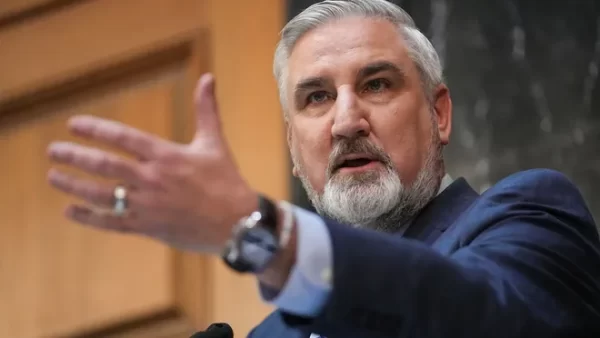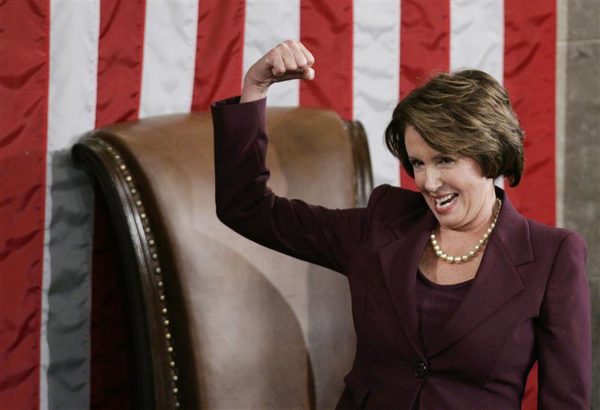Over the 246-year history of the United States, there have been thousands of Americans elected to serve in public office. From township boards to the United States Congress, people have demonstrated goodwill and upheld their oath of office for the betterment of their constituents. One of the most notable things, however, is the fact that the standards of what makes a “good” politician have drastically changed over the course of American history. In the 21st century, the time period in which I am most politically informed, there comes a great debate about what makes a good politician. Most people get their heads wrapped around party labels and biased media intake, leading to effective elected officials getting pushed out of their heads without a second thought. For me personally, I believe that a principled elected official is one who works effectively in the institution upon which they are elected. This includes having strong political grit, understanding your options on matters while being unequivocal in your voicing of them, and having the ability to compromise in order to get things done for the American people. From whipping party votes to holding high-ticket campaign promises one must be skilled in both the political and personal arena of everyday Americans. With this in mind, I have acquired a list of three officials who I believe go beyond the standards set forth, having strong records to prove their placement upon this list. I hope you find this information eye-opening and informative.
3. Eric Holcomb
I would like to start off by discussing the current Governor of Indiana Eric Holcomb. Holcomb is, in my view, an example of a politician who offers level-headed and informed responses to issues pertaining to the Hoosiers across the state. From working on civil rights issues in a bi-partisan fashion to improving local government, Holcomb has demonstrated his ability to compare efficacy with members of every faction in the General Assembly. Down below we can see some of the work the Governor has done in order to improve the lives of Hoosiers and make Indiana a more respectable place.
Making Indiana an Economic Powerhouse
One of the things that Holcomb has been most successful in is his ability to make overwhelmingly successful financial programs that have sent the state’s economy skyrocketing. Following the passage of the American Recovery and Rescue Plan Act and the finalization of the state budget negotiated by the Governor, Indiana now had over $500 million available for the rehabilitation of the state’s economy following the dreadful COVID-19 pandemic. Holcomb proposed the idea of crafting a commission that worked with local and county governments to send the funds directly to the communities at hand. The proposal became known as the “Regional Economic Acceleration Development Incentive ” and the formal scheme was approved by the Indiana General Assembly nearly unanimously. From the time the “READI” was formed Indiana has seen massive improvements in its economic standing with it being ranked 10th in the nation in overall economic standing according to CNBC. The program has brought massive amounts of revenue into the state with Holcomb announcing within just the past few months the approval of $350 million added to the IREAD funds from the Eli Lilly Corporation. Holcomb states that the funds are to be used for the reconstruction of abandoned sites such as homes, businesses, or manufacturing facilities and the improvement of community recreation facilities. More information on the IREAD can be found here.
Supporting Law Enforcement and the Community
Another thing Holcomb has an extremely flush record of is working with all members across the political spectrum in order to deliver results wanted by the people. We saw this happen back in 2021 with the formal negotiations of law enforcement reform legislation. Following months of civil unrest due to several reports of police brutality against Black Americans, the Governor held meetings with legislative leaders, executives within the Indiana State Police Department, and local NAACP representatives. Holcomb was able to produce one of the most comprehensive pieces of legislation passed by a Republican-led legislature with its contents being reasonable and adequate to the needs of all parties of interest. The bill passed the legislature with no formal opposition and gave millions of dollars to local police departments in all 92 counties. The bill was celebrated by Police labor unions and the Indiana Black Legislative Caucus. More information on the Law enforcement reform legislation can be seen here.
Strengthening Public Health
Lastly for Holcomb, I would like to discuss his prime focus on public health. Following the devastating public health crisis that was the COVID-19 pandemic, the governor formed an executive committee to reevaluate Indiana’s public health system and make recommendations on

its findings. The report found that the public health on the county level was extremely underfunded and lacked the appropriate resources.
Holcomb acted quickly and as the budget session came about he was determined to ensure that public health funding was a key aspect of the state’s new appropriation outline. Following negotiations between legislative leaders, Holcomb was able to send out nearly $250 million to public health services, primarily that on the county level. More information about health funding details and the committee’s report can be found here.
2. Gretchen Whitmer
I would now like to discuss Michigan Governor Gretchen Whitmer, someone who I believe meets the foundations of a public servant perfectly. From her time in the Michigan State Senate representing her hometown of Lasing, Michigan to her current position as governor, Whitmer has proven time and time again that she is a person who keeps her promises and takes distinguished action on things closest to the people of Michigan. Understanding the political game well, Whitmer has several factors that make her one of the most popular, and qualified, governors in the United States. Here are just a few.
Advocating for Public Education
The first issue the Governor has proven a strong commitment to is Education. We can see this most recently when she spearheaded massive education finance reform in the state budget during the legislative budgeting session last year. The price tag alone can speak for just how much Whitemer and her administration support public education, totaling just over $24 billion for all levels of education. Specified provisions within the budget raised the student educational allowance by 5% giving roughly $9.5 thousand to every student enrolled in a Michigan public school. Those living in economically disadvantaged school districts and those with a high English language learner population will receive addiction funds for a variety of targeted issues. Along with this, the budget included funds to subsidize school lunch fees for all of Michigan’s public school students. The budget also provided more than $60 million to the public educator retirement funds which drew support for school districts across the states and local teacher’s unions. Full details of the education appropriations within the state budget can be seen here. Finally, for this section on education, Whitmer’s support for education expanded following her reelection when she created a new executive department known as the “Department for Lifelong Education, Advancement, and Potential” dedicated to governer community college campuses and expanding access to adult work training programs.
Standing for Reproductive Health Freedoms
Reproductive health access has always been a high priority for Whitmer. Whitmer first began discussing the matter in the public light when she was in the state senate where during a debate on the question of whether or not health insurance companies can ask applicants if they had an abortion before, Whitmer disclosed she had been the victim of sexual assault in collage and underwent a medical abortion and on to state thousands of woman had similar experiences.

Following the Dobbs decision by the Supreme Court, Whitmer was one of the lead campaigners for a ballot referendum to place abortion rights in Mithcigan’s constitution. During her gubernatorial re-election campaign, she consistently stated that if the proposal was adopted by the voters she would direct each executive agency to work through their internal legal and public health policy to adhere to the new amendment. Following her re-election and the passage of the ballot referendum she did just that, issuing the order just one month following its passage. Full details on the executive directive can be seen here.
Support Worker Rights
Lastly for Whitmer, seen throughout her course as an elected official is her ability to stay true to her core base of voters. A core group Whitmer has been loyal to is labor unions, particularly that of the education and automotive industries. Just last year Whitmer was praised by labor unions as she signed the resolution to revoke Michigan’s 2013 “Right to Work” law. Along with this, Whitmer allowed the changing of policies relating to teacher bargaining limitations and expanded educators’ rights to negotiate things such as classes in which they teach, roster sizes, and evaluations. Considering her comprehensive support of the strikes with both the United Auto Workers and Teamsters unions, it is no surprise that over the course of her governorship, she has received massive support from labor unions ranging from service fields to manufacturing.
1. Nancy Pelosi
The last person I want to discuss and the one I believe has been the most persistent in her political grit, polarizing determination, and her unwavering support for the American people. Speaker Emerita Nancy Pelosi, during her nearly 37-year career in the United States House of Representatives, has been a figure for strength within the Democratic caucus, knowing how to get the votes by any means necessary. From being a champion for affordable health care to raising billions for Democratic Congressional candidates across the country, Pelosi is a seasoned politician who knows how to play at both ends of the table, a strong committed leader who advocates for the youth, the working class, and women’s rights to playing the political cards right and demolished any opposition that gets in her way of passing priority legislation. Below are some of the reasons why this Congresswoman for San Francisco earns her place as the United States’ most committed politician.
Working to Make Healthcare More Accessible
From the time Pelosi was elected to her congressional seat in 1987, she has been a trailblazer for public health policy. It originally started out as her advocating for funding to deal with the HIV/AIDS crisis, a rather taboo health topic to discuss in the House chamber, that riddled her districts and caused thousands of deaths. By the time she was elected as leader, however, her case for public health reform had broadened, and following her election as Speaker of the House in 2009 she saw it as her chance to enact meaningful change. As the Senate was working on a separate health package that was deemed essential and doomed due to the fact that no Republican member of the Senate would go public with their support. The bill was negotiated between President Barack Obama and Senate Majority Leader Harry Reid with the intention of getting Republican votes. Pelosi stood up to Obama by saying that the reality was no Republican was going to vote for a clear Democratic victory. Feeling frustrated with the negotiations, Pelosi formed a panel of House members labeled “Tri Com” dedicated to finding a comprehensive resolution to the health care reform issue. Within just a month the panel passed a health care reform package at a price tag of $3 trillion. The deal was relatively popular among members of the Democratic caucus, however, many more moderate members were considered with the idea that some states might use the regional funds for abortion subsidies. After working for weeks to find a compromise among the Progressive Women’s Caucus and the pro-life members of her party, Pelosi finally realized the only way to ensure the bill’s passage would be to include an outright prohibition of abortion subsidies in the bill. With this, the bill passed the House with not a single Republican vote. A new problem now arose for Pelosi, the bill passage in the Senate. Following the election of Republican Scott Brown to the Senate, the Democrats no longer held a filibuster-proof majority. This did not stop Pelosi, she was determined to get at least a portion of her bill into law.

By this time the Senate Financial Services Committee had passed a health package of its own titled the “Patient Protection and Affordable Care Act.” or “PPACA”. Pelosi struck a deal with Reed that if she was able to change certain previous of the Senate’s legislation to resemble the House’s version, and he would provide the vote within the Senate, she would follow suit in the House. With new bill changes the PPACA now fell under budget reconciliation, meaning it didn’t have to achieve 60 votes in the Senate. The bill passed in the Senate with not a single Republican member voting yea and now it was up to Pelosi to do the same. On Mar. 21st, 2010, Pelosi called the House to vote on the bill, and it passed with just one vote to spare. Pelosi was able to pass the bill with all 178 Republicans voting no and 34 Democrats voting no. Today, the bill has provided coverage to over 40 million Americans and expanded protections for those under private insurance plans. More detailed information about the Patient Protection and Affordable Act can be found here.
Understanding the Political Game
The next thing that makes Pelosi such a productive politician is her ability to remain in leadership positions through her political maneuvering. Starting from the time she ran for Democratic Whip in 2002, she was known for elevating those who supported her and punishing those who supported her opposition. A prime example of this was when Congressman John Dingell announced he would support Representative Steny Hoyer for Democratic Whip. Following her election, she voiced support for Dingell to be reassigned from his committee placements. More recently, following the 2018 congressional where Democrats won a majority in the House, Pelosi faced several leadership challenges. The first came from Representative Marcia Fudge who suspended her campaign for leader after Pelosi promised to reinstate the Sub-Committee on Voting Rights. The second was Representative Seth Molton who lost his bid after Pelosi dug in on his record often seen as favorable by conservatives. In the end, Pelosi won her bid for the speakership following hours of negotiations Over ⅔ of her caucus supported her and nearly all voted for her on the house floor during the internal vote. With this political maneuvering Pelosi has been able to govern beyond expectations and the whipping of the critical votes such as child care and health care legislation has made her even more favorable to the American people.
Being a Star Fundraiser
Another aspect of Pelosi’s political success is her fundraising abilities which have made her a trusted party figure for more than four decades. Back in 1981 Pelosi was recognized by her fellow California Democrats as a star fundraiser and entrusted her with chairing the party. During this time the party gained multiple legislative and congressional seats from Republicans, increasing her political credibility. This skill remained as she became the leader of House Democrats. In the 2022 congressional elections, she led the Congressional campaign area of the Democratic party to raise $362 during the election cycle, $80 million more than the Republicans within $289 million. More reporting on campaign information can be seen here. These figures show how successful Pelosi is with party donors and how she has used this ability to confide power for years with a multitude of successes for both her personally and for the American people.
As you have considered the following, I ask that you recognize that throughout the nation there are politicians who stick to their base and show determination for their respective causes regardless of political affiliation.
























